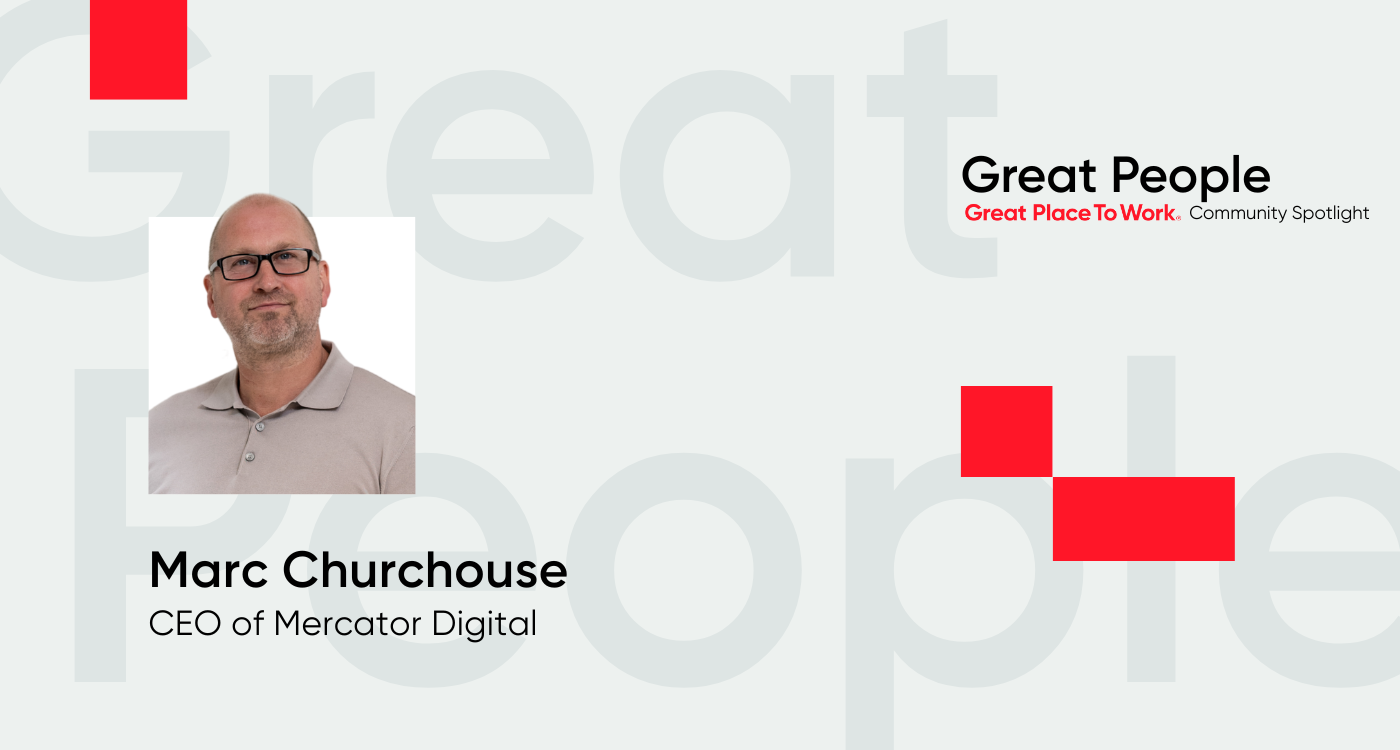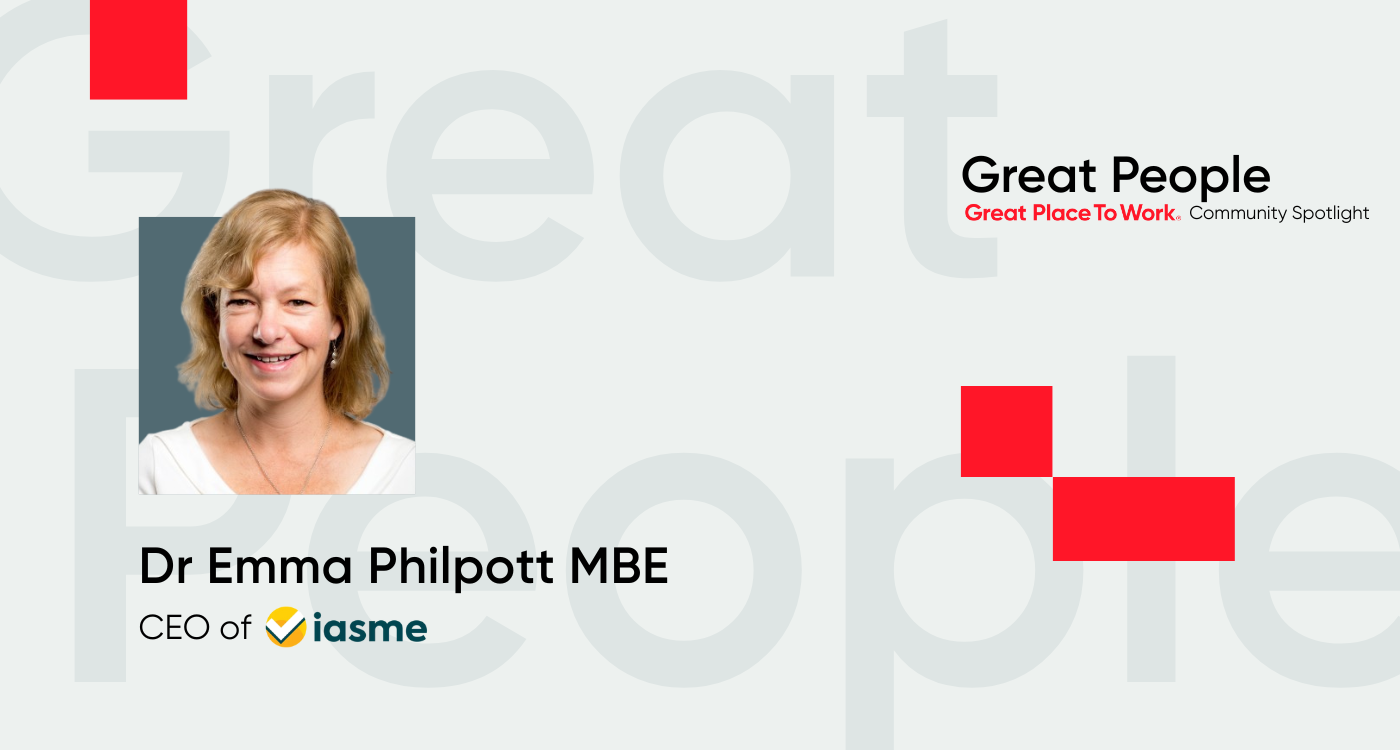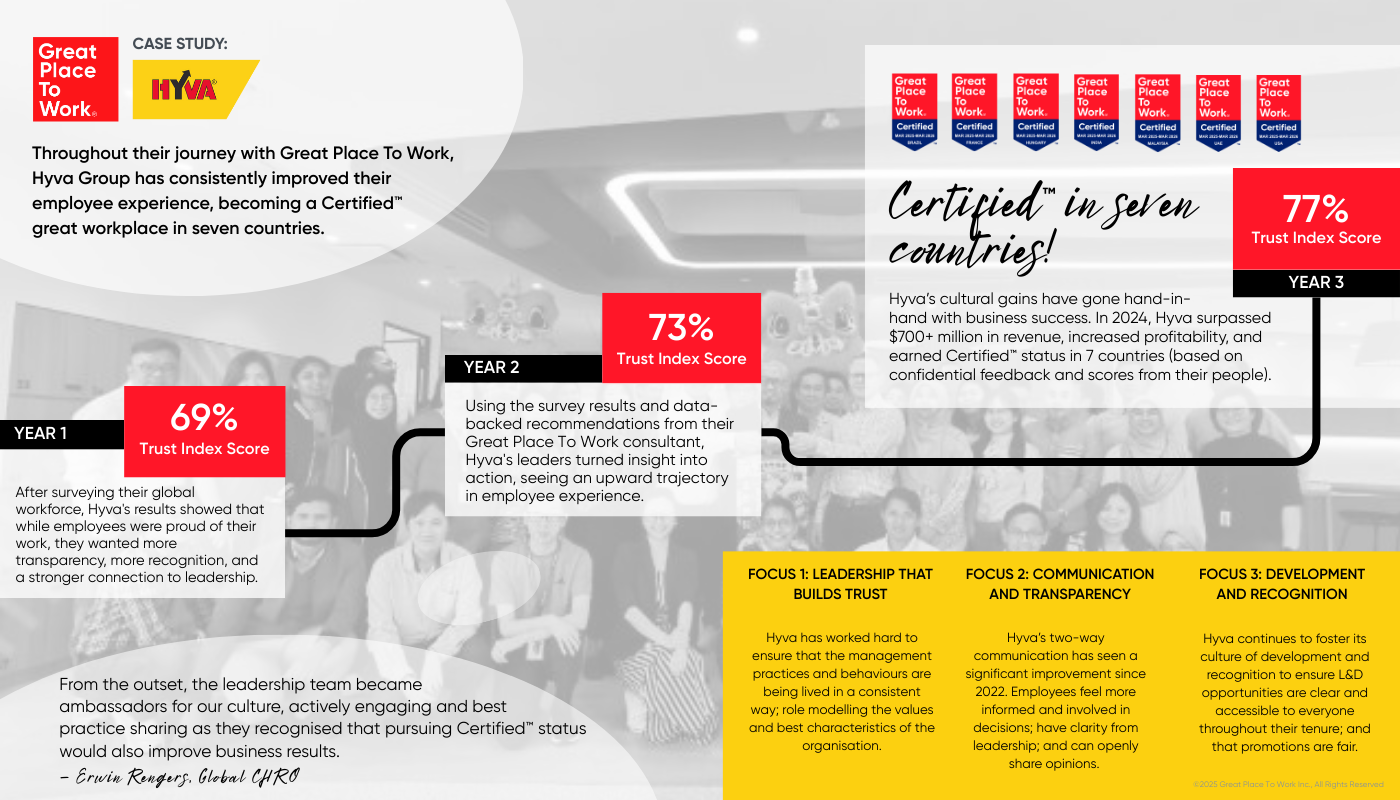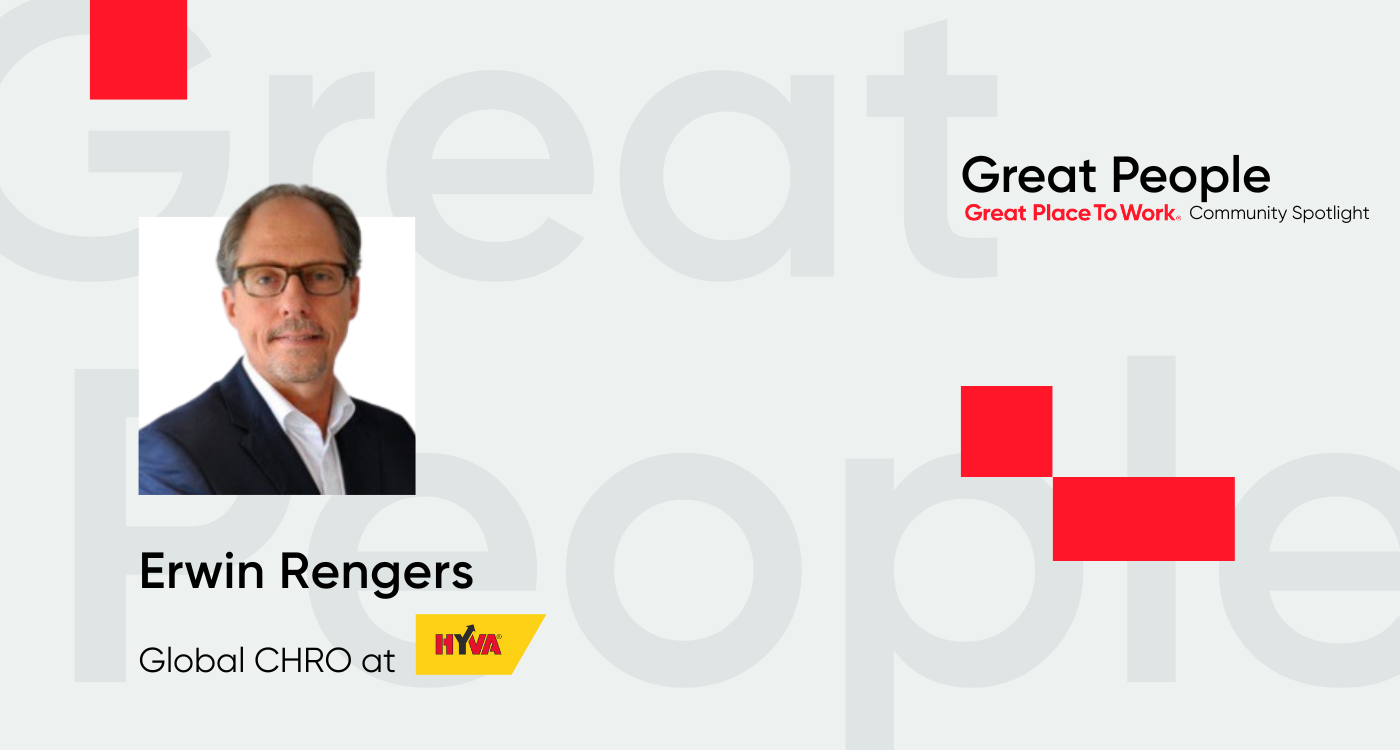Marc Churchouse, CEO of Mercator Digital – among the top 3 UK's Best Workplaces™ 2025 (Medium size category) – on how leaders can practice proximity leadership, authenticity, and the power of people.
What would you say gets you up in the morning as a person? What really motivates you?
Marc: Well, I wish it was the alarm clock – but I'm normally awake before it! Family, I would say. Both work and home. I'm lucky enough to see both places like being with family. I love problem-solving; that feeling you get when you've created something, done something, solved something. They're the bits that make me tick.
How would you introduce yourself and Mercator Digital?
Marc: I co-founded Mercator Digital in 2006, and currently I'm the CEO of the company. We build digital services, predominantly for the UK government. For example, we help enable the government to reach citizens quicker, and we help with reducing the government's carbon footprint and getting their carbon emissions targets into a better place. But we've grown into a trusted partner for both public and private sector organisations, and we do our best to deliver innovative digital solutions that drive meaningful change. Part of my role, specifically, is helping to foster a culture of innovation, collaboration, and excellence, so that Mercator continues to grow while staying true to our core values. That's kind of what we do in a nutshell.
It's incredible to see in your survey results that 100% of your people at Mercator Digital agree that "management is approachable and easy to talk to" – a central aspect of proximity leadership. Why do you think this sense of connection matters in today's world?
Marc: I think it matters not just in the workplace but in general. The things we talk about, empathy, curiosity, authenticity...they're all things that you have to be able to develop, empower. All of those things are something that you need to have in your workforce because if they're not there, it's just not going to be a nice place to be.
I think you find so many organisations that are so target-driven and they kind of miss the point a bit. If you do the right thing for the right reasons, most of the time the money bit will take care of itself. And if you give your people and your friends, your family, the room to make decisions, the room to feel empowered, that they feel that there's empathy between the two of you, you'll get the best out of them, always.
You need trust, don't you? You need honesty.
Yes. And I think it's fascinating how many times there's almost an over-focus on targets. It's not a focus on the things that will help get those targets met. How do we all work together? Do we have a strong connection? As soon as you just focus on a number, you start to lose some of the other parts of that, which are very, very important – on the people who deliver on that number.
Was there a particular time for you, as a leader, that you realised: this stuff matters, human connection and proximity matters?
Marc: I guess it's always been the leadership style that I have, for me as a person. And at Mercator we've always tried to hire in the same way, people, like-minded individuals that will fit in culturally, who want to make a difference, who want to have fun, but equally who'll work hard. And that feeling of having somebody's back and that trust element to that.
And I think when it really struck me was: we have parties every Christmas and in the summer. And I remember, probably two or three years ago, I stood in the party looking across the room and really noticing immediately how we managed to scale the culture. It was a very vibrant room full of people that I'd played no part in bringing in. I'm not involved in the recruitment of everybody anymore. I guess that's part of the empowerment. And at that point you realise: this isn't about me and my co-founders anymore. This business has got its own pulse.
That was a moment, I think, that proximity leadership really struck me – that we've achieved a culture, and scaled it so successfully.
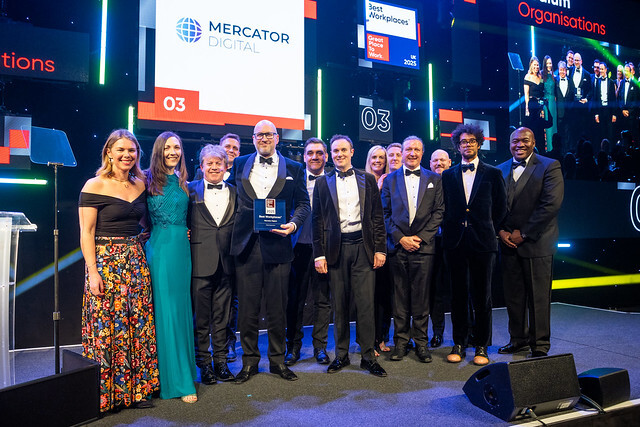
What a great feeling that must've been! How do you keep that essence going?
Marc: I guess now it's scalable, isn't it? Because when you have enough people who think the right way, when you get somebody who comes into the culture that doesn't quite fit, they get found out very quickly – or they have to come on board. It's kind of a movement.
And it's really interesting to watch. Nobody in the organisation wants to be the person in question when someone says, 'Who hired that person'?
Everybody becomes a custodian of the brand. We have our brand values, and they're not just something that we write, they're lived. As a leader, you have to be real and authentic. There has to be trust. You do need to take care, and that's not just taking care of your work, that's taking care of each other.
Are there any ways in which you explicitly help your leaders to have the skills they need to model proximity leadership?
Marc: We've always maintained a very flat structure. Everybody is within reach. Leaders sit with everybody else. If somebody in our organisation has a question, and they don't know the answer to it, they absolutely can come and knock on my door and ask me. And if I have the answer, then I'll give it to them. If I don't, I'll point them in the right direction. And that goes right across the organisation. It's a model that we feel works very well.
And there has to be empathy, full stop. You have to show that in effective leadership. You have to let people feel that they've genuinely got the ability to be empowered to make a decision. And if they get it wrong, that's okay! That's something that we work hard on to make sure that if you do empower somebody genuinely, then you accept that people do also make mistakes.
Are there any metrics or indicators that have shown you how proximity leadership is truly driving better business outcome alongside stronger relationships?
Marc: The business is growing year on year. Our client base is growing year on year. Our people numbers are growing year on year. When we get the Great Place to Work surveys through every year, we look at those and look at where we sit against the average.
I'm not a fan of worrying about what every other company's doing. I feel that if we focus on ourselves, that's the important thing to focus on.
If you start to measure yourself against things that you might see on social media or in PR articles, then you might suddenly feel that you're falling behind a little bit, but actually you're not. So focus on what you do and take real measurements in things like growth and revenue, growth in people, growth in clients, maybe even growth in margin (as that's an important one for some).
If you do the right things for the right reasons, you find the money part takes care of itself. And we're lucky to be here, nearly a £50 million revenue business with 450 people, and no borrowing of any kind. That's all organic growth by running our business in this way. People are powerful.
How do you help leaders to be curious without giving off the sense that there might be some micromanagement in there?
Marc: I don't think anybody feels that if they're asked a question they're being challenged or looked at through a microscope. I think part of the natural way that we do it, people just like to be involved.
And I recognise that I probably sit in a privileged position in that I know all aspects of the business, and I acknowledge that not everybody does. So it's fine for somebody to ask questions about other parts of the business, because knowledge is power, isn't it? It's important. And we always encourage our people to be curious. We will have regular lunch and learns; we have our communities of practice; we also just have communities.
One example is we split everybody in the business into house groups, like at school. Each house can choose their own charity that they earn house points for each year, and we play games against each other and have events, etc. It gives people from different teams, who wouldn't necessarily see each other, the ability to become friends with each other, and through that, you naturally find curiosity, because the conversation happens – what project are you working on? Where are you on that? How did you overcome that problem?... And so you find that, predominantly, a remote-first company, like ourselves, actually has a very strong bond between our people when they meet face-to-face, even though this may only be two or three times a year.
Sounds like it's mindfully thinking about human connection, so connecting people through whatever engaging thing it is, like your house programme, which is a way to get people to think beyond their silo and connect with other humans?
Marc: You need to feel part of something, don't you? Our staff retention at Mercator Digital is over 97%. Our people don't normally leave because they genuinely feel part of a family. I know some people might see the word family as a negative. But in our instance, everybody that's in Mercator sees it as a positive.
What would you say is the role of vulnerability in proximity leadership?
Marc: You have to hold your hands up. It's okay to make mistakes. From a vulnerable point of view, are you just being open, being as honest as you possibly can, and being in a place where you can be challenged?
You won't always be right, and that's absolutely fine. There are always going to be other people with other ideas that are probably going to be better than the ones you might have already thought up. And that's okay! You should welcome those, because then vulnerability isn't really a vulnerability, is it? It's actually a positive.
How do you manage to stay authentic and keep that approachability up while meeting all the different demands on you from stakeholders – customers, employees, trusted parties, and so on?
Marc: It was hard work. We're in a position where we have no outside investors, we have no banks sitting at the boardroom table. So we are in charge of our own destiny and goals. So my stakeholders are our clients and our people. This means it's quite easy to stay authentic – I just have to be me. And that's relatively easy.
What systems do you have to encourage dialogue at every level in the organisation?
Marc: We have lots of forums. We have the Great Place To Work survey every year, which encourages dialogue, because they're not just answers, it is great to have the feedback there.
We have a community team in place just to look after our people. I don't mean an HR team: our community team have touch points with every single member of our staff every month. That call isn't about work. That's about them. How are you? What are you up to? Sometimes people want to talk about work. Sometimes people will just want to talk about themselves, or ask for some help on something... But it's 'how are you?'
And then there's all sorts of social elements to it as well, from smaller teams to the whole team. We've got our summer party coming up, where I would imagine there'll be 250+ people in the room. So we try to really remove the barriers. And for us, it's okay for people to have those events in the workday. People don't just have to be focused on delivery all the time.
Consistently, we find a great workplace provides a fun environment and that human connection and energy is very often one of the most important key drivers in terms of providing a healthy organisation. It sounds like you take fun seriously at Mercator Digital, too.
Marc: We do! I enjoy the fun side and the social side of our work. I encourage it greatly. We have a very good team that want to spend time with each other. Equally, it's okay if you don't. You're not frowned upon because you don't come to every single event. We recognise that some people may find it less comfortable to be in a big, busy bar. Some people may prefer to be in a much more smaller environment playing board games. That's absolutely fine. But it's important that we have something for everybody.
Every year, we have several parties and we do online quizzes a couple of times a year to bring us together. The winning house group always picks a team game. We've done lawn bowls, interactive virtual clay pigeon shooting; they've just been to Fairgame to do fairground games... there's a lot of fun that goes on. It's about getting to know each other and forming those strong bonds that helps us work really well together, but also gets us through the tough times. The fun is quite a powerful investment of time.
With good proximity leadership, leaders are able to reflect on how different people experience the workplace, understanding that one size doesn't fit all. What's your take on this?
Marc: In terms of the physical proximity aspect: some people may not want to hot desk, for instance, but they might be in the office a little bit more than others. So we give them their space, their place where they feel comfortable. Some people might find it all too boisterous, too bright. So they might come in on a quieter day. Some people might prefer just to be at home. Some people might come in at 11am and go at 2pm, it's all okay. Not once does anybody sit in the office and go, 'Why are they in late? Why are they leaving early?' You've got to be able to come and go as you are and fit work into your life because it's a huge part of your life. And if we want to get the best out of our people, then again, that comes back to that trust, doesn't it?
You know when you've got something important to do that you can't not be there for. But equally, you know when you might be able to fit a dental appointment in or a gym session or things from a from a religious point of view, or whatever. That's absolutely fine. We have a reflection room in the office, so if it all just gets a bit too much, people can take themselves away and have some quiet time or they can pray if they want to pray. It's just meeting people where they are, letting them be them.
Ultimately, we have a delivery to do, and people know what they have to produce. If it's time-sensitive, then that's something that's probably been client-led, and our people know what they have to do. If it's not quite so time-sensitive, then absolutely they'll be able to fit in a bit more of their own stuff, and they can do work in the evening if that's what they have to do.
What would you say is the biggest challenge you've come across as your company's grown?
Marc: By far and away, the biggest challenge was the culture – and growing that from the two of us to the 450+ people that are with us today! That's both permanent staff and contractors that we bring in. Everybody has to represent Mercator in the right way. I think that's been the hardest of it all, because it's a constant challenge.
It's a disparate workforce, remote first, and so making sure that people feel part of something. For example, we've got staff whom I've never met in person, but they feel that I can lead them effectively, and they feel part of the business that we are today. And I think that's when you realise it's not just about you anymore, it's about everyone.
How do you help your leaders and managers to navigate the challenge of being close to their team, while still holding them accountable for difficult performance conversations or change?
Marc: I think there needs to be mutual respect. As much as we're flat, there's ultimately somebody who has to make the decision, and that's recognised. I think the managers, leaders have good enough relationships that the tough conversations can be done in a way that they don't have to be confrontational. Obviously, there's going to be situations where it can get difficult and people may need help. Often our community team may sit in on a conversation, if somebody from a team wants the community person to be there as well as their team leader, because we're not often solving problems just from a work point of view. There may be a personal point of view as well.
What advice would you give someone struggling to get buy-in on encouraging proximate leadership at work?
Marc: I guess it's got to become 'the way', hasn't it? I would find like-minded individuals within the organisation – start there. Try to have some sort of regular touch points with everybody within the business so that you foster that authenticity and start to create the culture as a small group and allow that to expand out.
We've built it from scratch. If you're already down the line, and you're not like that, then there may be some very tough conversations about changing mindsets, even potentially personnel. You all have to be bought in, or it doesn't work.


